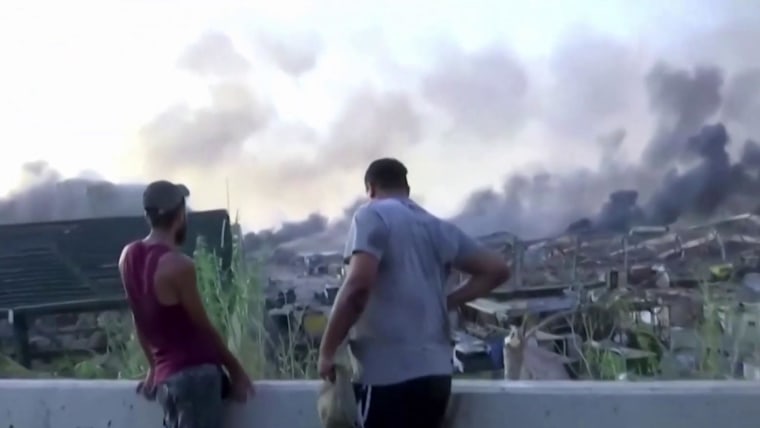A huge rescue operation and an international aid effort were underway Wednesday, less than 24 hours after much of Beirut was buried by rubble and choked by smoke in a colossal explosion Tuesday afternoon.
At least 100 people have been killed and 4,000 injured, the secretary-general of the Lebanese Red Cross, George Kettana, told LBCI, a local broadcaster on Wednesday. Those figures look set to rise with hospitals overwhelmed and victims still trapped underneath debris.
Lebanese President Michel Aoun called an emergency cabinet meeting on Wednesday.
Many in Lebanon’s capital saw their apartments destroyed and family members injured, with daylight revealing scenes of destruction not witnessed in the country since its devastating civil war, which ended in 1990.
Rescue workers were digging in the rubble, as plumes of smoke still rose above the city after a warehouse storing an estimated 2,750 tons of ammonium nitrate at a shipping port exploded, Prime Minister Hassan Diab said.
The deadly blast came as the Middle Eastern country was dealing with an unprecedented economic crisis that has seen its currency lose 80 percent of its value and unemployment spiral, with fed-up citizens frequently taking to the streets in protests this year.
French President Emmanuel Macron offered his condolences and said France was already sending emergency assistance. While Israel, Iran and Saudi Arabia, among others, offered humanitarian and medical aid.
“We are witnessing a real catastrophe,” Prime Minister Diab told reporters, appealing for international aid and promising a full investigation.
“I will not rest until we find the person responsible for what happened, to hold him accountable and impose the most severe penalties.”
Diab added that it was “unacceptable” that the ammonium nitrate had been in a warehouse for six years without “preventive measures” to protect it. The chemical compound, which is commercially available, is used in fertilizers and explosives.
It is still not clear what exactly ignited the shipment, but the blast could be felt and heard throughout much of the city and as far as the nearby island of Cyprus — about 145 miles away.
Images and videos were being feverishly circulated on social media with #PrayforLebanon trending on Wednesday along with international outpourings of solidarity and grief, while the front pages of Lebanese newspapers depicted striking scenes of chaos and destruction.
At a White House briefing on Tuesday, President Donald Trump said the explosion looked “like a terrible attack,” although he offered no evidence and said later that the conclusion was based on the presumptions of U.S. generals.
A U.S. State Department spokesperson said it wasn’t clear whether any Americans were killed or injured in the blast.
“Our heartfelt sympathies go out to the victims and their families,” U.S. Ambassador to Lebanon Dorothy Shea said in a statement. “We mourn each loss from this terrible tragedy alongside the Lebanese people.”
Download the NBC News app for breaking news and politics
The U.S. embassy in Beirut also warned residents about reports of toxic gases released by the blast, urging people to stay indoors and wear masks.
Separately, Lebanon is bracing for a U.N.-backed court to deliver a verdict Friday on the death of Rafik Hariri, a former prime minister who was killed by a truck bomb in 2005, sending the country’s fragile confessional political system into turmoil.
Mustafa Kassem reported from Beirut, Adela Suliman reported from London, and Tim Stelloh reported from California. Reuters contributed to this report.
Mustafa Kassem and Tim Stelloh contributed.













